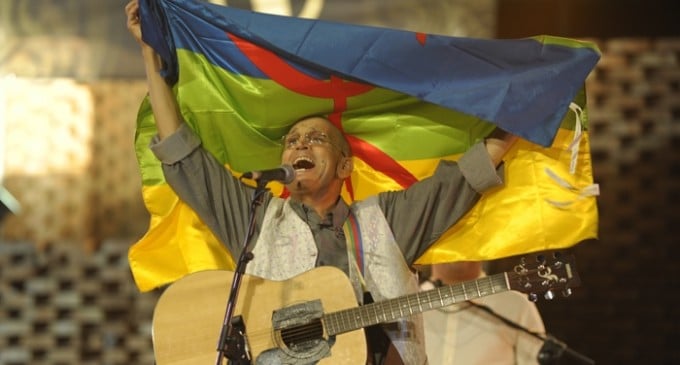Three years ago, on February 14th, Ammouri Mbarek, better known as the renovator of Amazigh music, lost his battle with cancer at the age of 64. A tribute to Mbarek’s life will be held on Sunday, February 14th, 2017, in his hometown village of Imezghalen in Taroudant.
Ammouri Mbarek was a Moroccan Amazigh artist born in the village of Irguiten, located in the heights of the Atlas Mountains in Taroudant, in 1951. As a child, he was a shepherd who used to hum different songs while grazing his family’s herd in the fields. At the age of eight, the tragic death of his parents led him to the nearby orphanage in Taroudant. He continued his studies in Arabic and French, gradually losing fluency in his native Berber dialect.
In 1969, Ammouri founded a musical group called The Birds along with his high school friends, who were influenced by Anglo-Saxon music. The group performed mainly in French. In the early 1970s, he moved to Agadir in search of a job. During this time, the famous group Nass El Ghiwane had gained prominence and was widely respected in the pop music scene.
Later, Ammouri joined another musical band, and together they founded a new group in the town of Tiznit called The Souss Five. They primarily sang in Arabic. However, encouraged by a member of AMREC, an organization dedicated to the renovation of Amazigh music, he moved to Rabat to conduct research on Amazigh music and heritage preservation.
In 1973, he co-founded the group Ousman. After five years of success and performances in various European cities such as Paris, Brussels, and Lyon, the group disbanded in 1978. In 1985, Ammouri won third place at the Mohammedia Music Festival for the song Gennevilliers, written by Ali Azaykou.
Ammouri then embarked on a solo career and released his first solo album, Tazwit Nera Nek Dim A Nmun, which translates to Bee, I Want to Be Your Company on Your Way. The album was composed by Mohamed Mestaoui. Ammouri continued innovating Amazigh music, delving deeply into its heritage. He performed texts by renowned Amazigh lyricists such as Azaykou, Moustaoui, and Akhiyyat. His songs often explored themes of love, exile, and lost identity.

